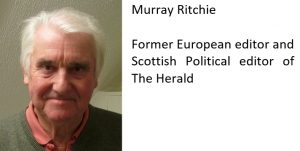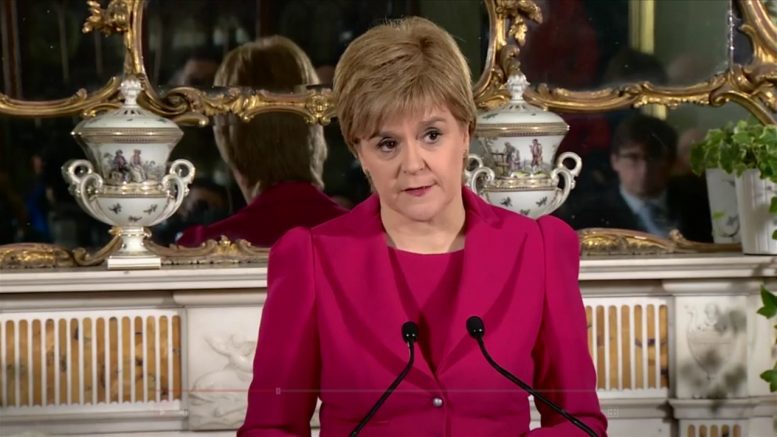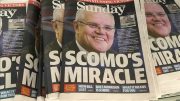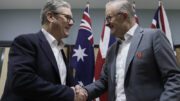If this election is going to be the Brexit election it is also going to be one that could decide the future of the British Union, reports Murray Ritchie from Scotland.
So Theresa May tells Nicola Sturgeon “now is not the time” for another Scottish independence referendum. The prime minister scolds the first minister of Scotland, reminding her that “politics is not a game”.
In her next breath Mrs May does a handbrake turn and says the time is right for a general election that will be all about Brexit in England and Wales and all about independence in Scotland.
Unsurprisingly many voters in Scotland seem to be not terribly impressed.
Yet, if this election is going to be the Brexit election it is also going to be one that could decide the future of the British Union. All general elections are like that in these turbulent times.
Theresa May has rather brazenly shown she is now the one playing political games.
For Holyrood’s ruling Scottish National Party (SNP) the poll on June 8 presents a challenge, but also an opportunity. A challenge, because with 56 of Scotland’s 59 Westminster seats there is only one way the party can go – and that is not up.
An opportunity, because the Nationalists are strong favourites to remain comfortably the controlling force in Scottish politics and leading the charge of the Holyrood majority for independence.
In what will necessarily be a hastily produced manifesto, they will promise another independence referendum – and Mrs May will probably repeat this is not the time for playing politics.
This time round, however, the prime minister’s protestations will not carry the same force. She has rather brazenly shown she is now the one playing political games.
Most observers in Scotland expect the SNP to keep most of their Westminster seats. Only a dramatic series of losses could dent the party’s pre-eminence. As of today the SNP enjoys a strong lead in the polls.
Of course the Unionist opposition parties will argue that any diminution of support for the SNP means a lessening public demand for indyref2. Ms Sturgeon will simply disagree and press on.
Regardless of the result in June, the SNP will still have their mandate from the 2015 general election for calling indyref2. The question now is how they will go about it in the face of opposition in Downing Street.
There was a time when Unionists argued that a SNP majority of MPs in Scotland – an assumed impossibility – was the obvious requirement for independence. That idea died when the majority happened.
Successive SNP leaders also used to claim a majority would justify a declaration of independence – so-called UD Aye – but that too faded. But suddenly there are fresh calls from the more eager nationalists in the blogosphere for its rebirth.
While the Scots government agitates for independence, there are renewed calls for a referendum in Northern Ireland on Irish reunification.
While the more canny Ms Sturgeon goes about explaining how exactly she will tackle indyref2 she will come under renewed pressure to tell voters whether she wants an independent Scotland to remain in the European Union (as 62 per cent of Scots voters wished in last June’s referendum).
Since one-third of SNP voters favoured Brexit she has a need to bring them on board. She might park that problem and leave a decision on EU membership until after indyref2.
Although Ms Sturgeon personally favours Scotland joining (or rejoining) the EU, she is seemingly prepared to consider settling for single market membership only.
A decision on joining the EU or not cannot be put off for much longer. Clarity is required and the election has set Ms Sturgeon a deadline.
It is a strange and unintended consequence of Brexit that the UK is facing fresh and pressing problems in its constitutional composition.
While the Scots government agitates for independence, there are renewed calls for a referendum in Northern Ireland on Irish reunification.
Northern Ireland voted Remain in the EU referendum leaving the Unionists to figure out how to keep a soft border with the Republic after Brexit. And England itself is deeply split on the EU.
Mrs May said she was calling the election because the country was coming together while Westminster was split. She is right about Westminster, but where she got the idea that Britain was healing itself after Brexit requires some elucidation. While England and Wales vote in June on Brexit, Scotland will be voting on independence.
In one respect, however, there is an undeniable logic in Mrs May’s politicking. She can take advantage of a currently inept Westminster opposition (she calculates) to gain a solid Conservative majority.
While that might help with the challenge of Brexit – and a hard Brexit at that – it could make matters worse in Scotland, Northern Ireland and even pro-Remain London.
If she worries about the break-up of Britain, which she is sworn to prevent, she might reflect on her own advice – and conclude that, indeed now is not the time for political games with weary voters.





